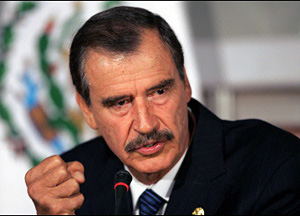 |
 |
 |
 Editorials | At Issue | October 2006 Editorials | At Issue | October 2006  
Mexican Lawmaker: Fox Term 'Black Sexenio For Freedom Of Expression'
 Mark Fitzgerald - EditorandPublisher.com Mark Fitzgerald - EditorandPublisher.com


| | "This sexenio will be remembered as a black sexenio for liberty of expression," Mojica Morga told the publishers and free-press advocates, speaking in Spanish and using the word for the single term allowed a Mexican president. |
A Mexican opposition party congresswoman famed for her pro-press legislative proposals told the Inter American Press Association (IAPA) at its annual meeting Sunday in Mexico City that, despite conventional wisdom, President Vicente Fox's six-year term was a dark time for freedom of expression.

Along with a Mexico City freelance journalist who came to national fame for her sensational exposé of a politically connected child prostitution and pornography ring, the congresswoman, Beatriz Mojica Morga, called for an end to "criminal libel" and insult laws that are still maintained by many Latin American nations. In many cases, these laws provide for fines and jail terms for statements that may be true but offend certain officials or institutions.

But it was her comments on Fox's legacy that were more controversial. Fox is scheduled to open the IAPA General Assembly formally today with a keynote address.

"This sexenio will be remembered as a black sexenio for liberty of expression," Mojica Morga told the publishers and free-press advocates, speaking in Spanish and using the word for the single term allowed a Mexican president.

She also suggested that in addition to the well-known instances of "impunity" which allows the masterminds of crimes against journalists to escape without punishment, Mexico suffered from a "grand impunity" from the top.

Mojica Morga is a member of the Democratic Revolutionary Party (PRD). Mexico's national election commission has ruled that PRD presidential candidate Andres Manuel Lopez Obrador lost to Francisco Calderon, like Fox a member of the National Action Party (PAN). Lopez Obrador and most PRD leaders say they will not recognize Obrador as president when he takes office Dec. 1.

Fox's term has been the best and worst of times for Mexican journalists.

On the one hand, he pushed through a national freedom of information law, appointed a special prosecutor to investigate violent crimes against journalists, and ended for good the dying system of under-the-table government payments to reporters. On the other, the Fox sexenio has been an especially violent one for working journalist, 22 of whom have been assassinated and two disappeared and presumed dead in the past six years, according to the count of a Mexican congressional committee. Almost all these reporters died at the hands or on the orders of narcotics traffickers - almost none of whom have been arrested, let alone convicted.

Mojica Morga also said that government advertising continues to be allotted among newspapers and broadcast outlets on a "very discretionary" basis, saying that "public resources are being used" to reward or punish coverage.

The PRD representative in the legislature's lower house has introduced several measures to increase press protections - including, this June, a federal shield law. "We want a press that is strong and free, with the security it needs to perform on behalf of society," she said.

Mojica Morga argued with a rising voice at IAPA that Mexicans will never have freedom of expression as long as libel is criminalized. "In a country like ours, the people must have a voice, have access to newspapers, have access to TV, to complete the right of information of the citizens of Mexico," she said.

Criminalized speech is not a problem just in Mexico, IAPA delegates were reminded later Sunday. A report on press climate in Venezuela during the last six months noted that a newspaper columnist was sentenced to two years in prison this June for "insulting" a government minister.

Lydia Cacho's expose of the child-sex ring in the state of Quintana Roo led to her arrest on criminal libel charges, and has put her in physical as well as legal danger, she told IAPA. The state legislature voted against decriminalizing libel, on the grounds that, in the absence of a jail threat, journalists would feel free to damage the reputation of politicians. "They were thinking only of themselves, of course," she said.

Speaking with a passion that rivaled the politician's, Cacho said Mexico has "links between political power and organized crime, and when you pick at this tissue, you are in danger...We independent journalists are the ones who are killed and disappeared because we who have dared to investigate this."

Many IAPA members responded with a standing ovation.

Mark Fitzgerald (mfitzgerald@editorandpublisher.com) is E&P's editor-at-large. | 
 | |
 |



